EAB2021 Workshop: Using the IUCN Global Standard for Nature-based Solutions
The British Ecological Society is teaming up with the IUCN and representatives from the Wildlife Trust and RSPB to deliver a workshop at Ecology Across Borders about the design and application of nature-based solutions.

Nature-based solutions (NbS) seek to protect or enhance nature in a way that helps tackle climate change and other societal challenges, while benefitting biodiversity and improving human wellbeing.
The BES Policy Team, together with the IUCN, is organising a workshop to discuss how to design, implement and assess NbS to ensure their full benefits are realised. The workshop will be held at the Ecology Across Borders conference, on Monday 13th December, 2021 at 1:15pm.
The speakers will present the BES’ seminal report on NbS and the IUCN Global Standard for Nature-based SolutionsTM. The workshop will also present case studies from different habitat types, with speakers from the RSPB and Wildlife Trust discussing key elements, challenges and solutions with the audience. It will be chaired by Phillipa Gillingham (Bournemouth University), one of the members of the Steering Group of the BES report.
The BES report
Led by over 100 world-class scientists, the British Ecological Society’s nature-based solutions report examines how NbS can be implemented to mitigate and adapt to climate change, as well as their limitations and the inevitable trade-offs involved. Its review of the evidence offers a guide for policy development in all four devolved nations of the UK.
During the workshop, Mike Morecroft (Natural England), another Steering Group member, will discuss some of the key findings from the report and recent NbS policy developments in the UK.
The IUCN Global Standard for Nature-based SolutionsTM
Recognising that NbS are a powerful tool to address societal challenges, such as climate change and biodiversity loss, the IUCN developed the first-ever ‘Global Standard for Nature-based Solutions’ which aims to help users design and implement NbS, and provides a framework to assess NbS projects.
The Global Standard includes a self-assessment consisting of eight criteria and associated indicators for NbS projects. Alongside this, it instructs users in how to design a new NbS project, upscale pilot projects and assess past projects and future proposals. The intention is that the Global Standard will prevent misunderstandings and misuse of the concept of NbS and will therefore enable decisionmakers, investors and funders to feel confident in NbS initiatives.
The workshop will introduce the concept of the IUCN Global Standard for Nature-based Solutions, looking into why it is important and how it is applied in practice.
Workshop Case Studies: NbS in Practice
Rachel Hall (The Wildlife Trusts) and Lee Schofield (RSPB) will discuss the challenges and successes of implementing NbS on the ground, based on the following four case studies.
Centenary Riverside: A nature reserve was created at the Centenary Riverside in South Yorkshire through a partnership project between Sheffield and Rotherham Wildlife Trust, Rotherham Metropolitan Borough Council, the Environment Agency and Yorkshire Forward. The reserve has helped create space, thereby reducing flood risk, and provide much-needed habitat for wildlife. It also benefits local communities through the provision of new public green space and helped boost the economy. The Centenary Riverside was tested against the Global Standard to assess the standard and longevity of the project and was found to be in adherence with the criteria.
Great Fen: The Wildlife Trust for Bedfordshire, Cambridgeshire and Northamptonshire seized the opportunity to act as one of the five UK Pilot areas trialling the Global Standard methodology and self-assessment tool. They used it to assess the success of rewetting peatlands in the Great Fen to help address societal issues such as wildlife declines and climate change.
Sussex Kelp Restoration Project: The Sussex Wildlife Trust applied the Global Standard to inform and develop the design of the Sussex Kelp Restoration Project, a collaborative marine rewilding project that aims to restore almost 200 square kilometres of lost kelp forest along the Sussex coastline. This project aims to contribute to our understanding the role of kelp in the blue carbon cycle.
Haweswater: The RSPB and United Utilities water company jointly manage a site at Haweswater in the Lake District which is a haven for wildlife and visitors alike. The RSPB is working with neighbouring landowners to revive the area and restore peatland – an important natural carbon store. The landscape restoration has also helped reduce flood risk for local communities and led to improved water quality which has provided biodiversity benefits.
Find out more at the workshop which will be run as part of the Ecology Across Borders (in-person) conference on Monday 13th December, 2021 at 1:15pm GMT.
Like what we stand for?
Support our mission and help develop the next generation of ecologists by donating to the British Ecological Society.